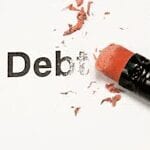 Categories of Debt
Categories of Debt
All debts are either secured or unsecured. In the case of a secured debt, if the debt is not paid, the creditor has some type of collateral it can look to for payment. The best examples are mortgages and liens arising from the purchase or lease of a car. Any debt that is not a secured debt is unsecured debt.
When a debtor has an unsecured debt the creditor has no collateral it can look to if the debt is not paid. Most credit cards are unsecured debt. There are three different categories of unsecured debt: debt owed to the government, debt arising from a consumer transaction, and non-dischargeable debt. Eliminating debt owed to the government can be challenging. Settling government debt is not available nor is credit counselling. Government debt, however, can often be eliminated when the consumer makes a consumer proposal or files for personal bankruptcy.
Eliminating unsecured consumer debt is less daunting. A consumer might be able to take advantage of a limitation period, make a one-time lump sum payment, do credit counselling, make a consumer proposal, or file for personal bankruptcy. Non-dischargeable debts are those debts which cannot be eliminated by making a consumer proposal or filing for personal bankruptcy. These include the following:
- Spousal support and child support obligations
- Government fines
- Student loans where a person ceased to be a student less than seven years ago
- Civil judgments involving fraud
Contact Rumanek & Company Ltd. for more information on bankruptcy and debt solutions. Or please fill out the free bankruptcy evaluation form. To learn more please visit our YouTube Channel. Rumanek & Company have been helping individuals and families overcome debt for more than 25 years.

 Categories of Debt
Categories of Debt How can I avoid Collection Calls
How can I avoid Collection Calls If I Declare Bankruptcy can I be a Director?
If I Declare Bankruptcy can I be a Director? Bankruptcy and Student Loans in Canada.
Bankruptcy and Student Loans in Canada.